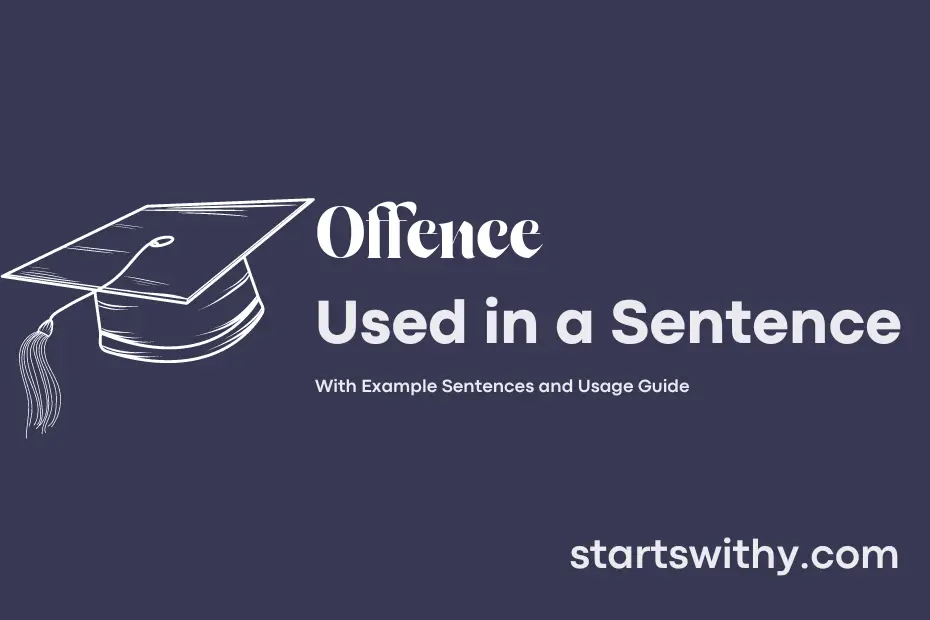Have you ever been unsure about whether a particular action might be considered offensive? Let’s break down this term: “offence” refers to something that causes feelings of displeasure or resentment. In the context of behavior or remarks, it often involves violating social norms or crossing boundaries that can upset or hurt others.
Recognizing what constitutes an offence can vary greatly depending on cultural, social, and personal factors. Being mindful of how our words and actions impact those around us is essential in avoiding unintentionally causing offence. By understanding the nuances of this concept, we can navigate social interactions more effectively and foster better communication and mutual respect with others.
7 Examples Of Offence Used In a Sentence For Kids
- Offence means hurting someone’s feelings.
- It is important to be kind and not cause offence.
- We should always think before speaking to avoid offence.
- Apologizing can help make up for any offence caused.
- It is good to remember that everyone can feel offence differently.
- We should always try to treat others with respect to avoid offence.
- Sometimes it is best to talk to a teacher if someone causes offence.
14 Sentences with Offence Examples
- Offence was taken by the student when his professor criticized his presentation in front of the class.
- Cheating on exams is considered a serious offence in most colleges and universities.
- The use of inappropriate language in a group project can lead to offence among team members.
- Plagiarism is a major offence in academic writing and can result in expulsion from the college.
- Skipping classes without a valid reason is often seen as an offence by college authorities.
- Sharing exam questions with others before the test is considered an offence that can lead to academic penalties.
- Making fun of someone’s cultural background can cause offence and hurt feelings among international students.
- Being late for group meetings can be perceived as an offence and lead to tension within the team.
- Failing to follow the dress code set by the college may result in disciplinary offence.
- Posting offensive comments on social media can lead to offence and damage to one’s reputation among peers.
- Making personal remarks during a debate can sometimes cause offence among classmates.
- Being rude to professors can be considered a serious offence and result in negative consequences.
- Not acknowledging sources in academic papers can be seen as an offence of academic integrity.
- Engaging in physical fights on campus is a serious offence that can lead to suspension or expulsion from the college.
How To Use Offence in Sentences?
Offence can be used in a sentence in various contexts. In general, it refers to a violation of rules or a source of displeasure or annoyance.
Here are some examples of how to use offence in a sentence:
- He took offence at her comment and stormed out of the room.
- The team’s rough play resulted in several offences being called by the referee.
- She apologized for causing offence with her insensitive remarks.
- The company’s new advertising campaign caused offence in some communities.
- It is important to consider cultural differences to avoid causing offence.
When using the word offence in a sentence, it is crucial to consider the context in which it is being used. Make sure the sentence is clear and conveys the intended meaning. Additionally, pay attention to the spelling of the word, as it can be confused with “offense” in American English.
By practicing using offence in different sentences, you will become more comfortable with incorporating it into your writing and conversations. Remember to always be mindful of the impact your words may have on others to avoid causing any unnecessary offence.
Conclusion
In conclusion, the examples of sentences with the keyword “offence” demonstrate its various contexts in legal, sporting, and social settings. Whether describing a criminal act, a violation of rules in sports, or feelings of resentment and hurt, the word “offence” carries different meanings depending on the context in which it is used. It is important to understand the nuances of this term to effectively communicate and interpret messages accurately.
By examining the diverse usages of “offence” in sentences, one can appreciate its versatility and significance in language. From legal proceedings to everyday interactions, recognizing when and how to employ this term can enhance clarity and avoid misunderstandings. Therefore, awareness of the implications of using the word “offence” can contribute to more effective communication and a deeper understanding of the messages being conveyed.



